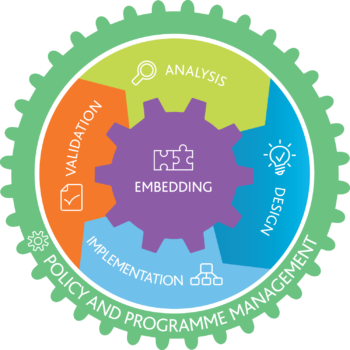Business Continuity
The basic principle of Business Continuity is to continue to deliver our 'priority activities' in the face of a disruption; whether that be from an ICT failure, severe weather or an infectious disease. The ISO Standard surrounding Business Continuity Management, ISO 22301:2012, defines it as:
A holistic management process that identifies potential threats and the impacts of those threats (if realised) to business operations. It provides a Framework for building organisational resilience with the capability of an effective response that safeguards the interests of key stakeholders, reputation, brand, and ‘priority activities’.
An 'Introduction to Business Continuity (BC) Planning' can be found here: Introduction to BC. The University Executive Board (via the Policy Oversight Group) approved the Business Continuity Planning Policy in April 2023. This policy details roles and expectations of the university community in relation to Business Continuity Planning. For more information please refer to the 'Business Continuity Policy' here: BC Policy.
Business Continuity (BC) Planning Cycle

Robust and effective BC management encompasses all of the above stages of the BC Planning Cycle.
- The first step is to Analyse what the Priority Activities are for an area. These are the critical functions within an area that must continue and/or be recovered as quickly and as effectively as possible.
- The second step is to Design a BC Plan which outlines the aforementioned activities, what they require in order to continue, how they link in with other internal teams and external stakeholders, and what alternatives there are if these activities suffer disruption.
- The third step is to Implement the BC Plan. This involves agreeing the BC Plan with key staff members and stakeholders and actively working to embed the plan and its guidance into team culture, understanding and training.
- The fourth step is to Validate the BC plan, which is a cyclic, ongoing element. BC Plans are required to be reviewed and tested every 6-12 months, which the Risk & Resilience Team can facilitate. Key staff from the team take part in a scenario-based exercise at least every 12 months to test the BC plan 'in action' and ensure that it is up-to-date and fit for purpose.
Business Continuity Plans

Business Continuity (BC) plans are an essential element of the BC Cycle and of the University's Governance and Emergency Planning functions. Our Business Continuity Plan Template can be found, here: Business Continuity Plan Template
- Senior management are responsible for ensuring that a Business Continuity Plan, and other appropriate business continuity arrangements, are in place and signed off for their Department/ School/ Faculty.
- The Risk and Resilience Team are responsible for the development, maintenance and annual review of the Business Continuity Policy, Framework and Programme ensuring that it remains aligned to the University’s strategic objectives. The Risk and Resilience Team will also provide oversight during serious incidents and co-ordinate the response of the Major Incident Team for major incidents
BC Plans help areas to:
- Outline alternative arrangements and potential recovery activities to enable functions to continue to operate and restore their usual levels of service in the event of an incident
- Help inform decision making during and after incidents
- Complement the Risk Management Link opens in a new windowand Incident Management Link opens in a new windowprocesses
In formulating their BC plan, departments should consider which academic departments or central services they would depend upon to regain full functionality. This could include departments with which they share teaching or research partnerships, or central services such as ITS or Estates. It is also important to consider external stakeholders as well as key suppliers of goods and services.
The Risk & Resilience Team encourages you to contact them to discuss business continuity arrangements within your area. The team offers guidance in the form of meetings, workshops and presentations and can develop bespoke scenario-based exercises to focus on the issues that are pertinent to your area.
If you would like to discuss this further, please contact:
Neil Slattery, Head of Risk and Resilience: Neil.Slattery@warwick.ac.uk
Kimberly Jebson-Hambly, Risk and Resilience Manager: Kimberly.Jebson-Hambly@warwick.ac.uk
Salma Ahmed, Resilience and Resilience Manager: Salma.Ahmed.1@warwick.ac.uk
or email businesscontinuity@warwick.ac.uk.
Testimonials
Dr Ian Hancox - Research Technology Engagement Manager, Research Technology Platforms
In addition to support with standard business continuity planning documents, the Risk and Resilience Team played a vital role in helping the Research Technology Platforms (RTP) begin the journey in ensuring that not only our business continuity needs were met, but also those of key stakeholders across the University. This ensured that we were ready for the worst case scenarios. The Risk and Resilience team made the process seamless. They attended meetings to explain the process and to listen to our needs, before organising and facilitating a working group to scope potential gaps and issues, responsibilities, and look at next steps. We all know once the right people are in contact with one another it makes work much easier, and the team did a fantastic job of enabling this. We found that the Risk and Resilience team were also a key 'neutral party' in supporting everyone’s common aim of ensuring robust business continuity were met.
I would strongly recommend getting support from the Risk and Resilience team to help alleviate the burden of identifying who is responsible for which areas across campus, to bring together people to reach a common goal, and to support the identification of resilience gaps before it is potentially too late.
Emma Durrant - Operations and Compliance Manager, Warwick Employment Group
We first engaged with the Risk & Resilience team when they offered to run a table top exercise to test the effectiveness of WEG’s Business Continuity plans. The team facilitated the exercise for us, asking us in an informal setting to consider our plans against two scenarios they provided. This test proved to be extremely useful and as a result we were able to identify gaps in our plans, assign responsibilities where they hadn’t been clear, update our processes, and formalise our communication plans. They have continued to support us since this exercise, providing advice and feedback on any updates we have made to our plans, and carrying out further scenario based tests over the years. The team have been a pleasure to work with; they are supportive and informative and their timely review and test of our plans at the end of 2019, just before the pandemic hit, meant that our transition to home working was a simple process for all staff involved. I would highly recommend this process and its value was proven during the Covid pandemic.
Wendy Roberts - Director of Staff and Student Accommodation, Estates
I really appreciated the help and support from the Risk and Resilience team in reviewing our business continuity plans. The questions from the team helped to improve the plan and ensured we had covered all the essential areas. The final plan is robust and well thought through as a result of the support we received.
Additional Guidance
The University is committed to Business Continuity Planning as part of its on-going emergency planning processes and is a member of HEBCoN (Higher Education Business Continuity Network).
Further information can be found on the following websites:
The Business Continuity InstituteLink opens in a new window
Government advice on Business ContinuityLink opens in a new window
